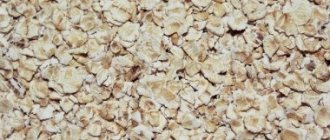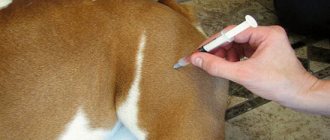When to use
Allergic attacks in animals are much more severe than in humans. If a person “gets off” with swelling of the mucous membrane, runny nose and sneezing, then pets’ paws will also swell. The dog constantly licks its limbs and scratches its skin, which leads to ulcers and non-healing dermatitis. For some breeds, an attack can be fatal.
Your dog may have an allergy if the following signs are observed:
- skin redness;
- itching;
- lacrimation;
- eczema of the outer ear;
- cough;
- nasal discharge;
- swelling;
- abnormal sweating;
- rashes in the armpits and on the stomach;
- unpleasant smell of wool;
- swelling of the limbs;
- hair loss;
- vomit;
- diarrhea.
Irritation is caused by odors from household chemicals, aerosols or perfumes. An attack is also possible when changing food, or being stung by a bee or mosquito. Giving Suprastin to a dog with allergies is necessary to quickly relieve the attack.
Veterinarians also prescribe this antihistamine in the following cases:
- Before deworming (especially breeds prone to drug intolerance).
- Before scheduled vaccinations and during drug therapy (to exclude anaphylactic shock).
- To relieve symptoms of neurodermatitis.
- For bronchial asthma.
- From seasonal hay fever.
- To eliminate Quincke's edema.
- In case of motion sickness on trains.
- Pregnant dogs with nausea.
- With motor excitement (suprastin has a slight sedative effect).
Purpose
An allergic reaction is the body's response to various irritants. The reaction is absolutely individual: what does not cause allergies in some animals can cause anaphylactic shock in other animals. Manifestations of allergies can also be different, but in most cases the following signs appear:
- severe itching, which leads to the dog scratching itself until wounds appear. Scratching appears on the body, and bald areas of the body are noticeable in places. Constant itching negatively affects the pet's nervous system;
- redness or rash - the skin may become covered with red spots, usually on the stomach and back, in the armpits and on the ears;
- swelling – the paws usually swell, causing severe discomfort in the dog;
- cough;
- runny nose, nasal discharge;
- lacrimation, redness of the eyes;
- increased sweating;
- dry skin;
- diarrhea, vomiting. Most often they occur with food allergies and hypersensitivity reactions to medications;
- unpleasant odor from the body and fur.
Allergies in pets are much more severe than in people. Usually the reaction manifests itself in several symptoms at the same time - plant pollen, which causes rhinitis and lacrimation in humans, will be accompanied by severe itching and swelling of the limbs in a dog, which without treatment will lead to severe scratching and the appearance of weeping ulcers on the body. And this is an open gate for a secondary infection to enter the body.
Important!
It is necessary to carefully monitor your pet’s reaction when changing food or taking medications.
The causes of allergies can be different. The most common is an allergic reaction to fleas, other ectoparasites, or more precisely, to their saliva. It contains a foreign protein that enters the animal’s blood during a parasite bite. The disease is seasonal and most often occurs in summer and autumn. In the warm season, walks become longer, and the animal’s risk of picking up fleas on the street increases. In autumn, fleas become more active - they are preparing for winter hibernation.
Flea dermatitis is not difficult to diagnose, but it is much more difficult to cure. Collars, special shampoos and anti-parasitic drugs will help rid your pet of insects on his body, but on the street during a walk there remains the risk of an insect bite, which may be enough for the dog to begin to actively itch.
The next most common and most difficult to treat allergic reaction is to external irritants. There are always microscopic particles of dust, pollen, and mold in the air, which cause a negative response from the body in the form of rhinitis, conjunctivitis, itching and other unpleasant symptoms. Atopic dermatitis most often occurs in puppies and young dogs between one and three years of age.
Important!
It is impossible to completely cure atopic dermatitis! You can only make your pet’s life easier by trying to eliminate the presence of possible irritants as much as possible. It is recommended to carry out wet cleaning of the premises more often, replace carpets with parquet, and at least take the pet to the countryside for the summer.
Atopy can take on the most unusual appearance. For example, the following types of allergies occur:
- in the sun - when the animal only has to walk outside early in the morning or in the evening after sunset;
- on perfumes and cosmetics used by the owner or surrounding people;
- on the owner. Particles of human skin or hair may contain specific substances that cause irritation.
The rarest type of allergy is food. It can occur when feeding your pet low-quality industrial food or certain types of products. Among them, the most allergic are considered:
- beef;
- chicken meat;
- wheat;
- dairy and fermented milk products.
It is easier to cope with such an allergy: when feeding natural food, exclude from the diet foods that cause a negative reaction in the dog’s body, or switch it to feeding industrial food, and among the latter, choose high-quality or grain-free holistic food.
Some medications, including those prescribed by your veterinarian, can cause a hypersensitivity reaction in your pet. In this case, you should immediately stop taking the medication and inform your veterinarian about the allergy. He will prescribe another remedy and draw up a symptomatic therapy regimen.
Important!
Suprastin is recommended by veterinarians as a first aid remedy to relieve allergy symptoms and alleviate the condition of the animal.
Characteristics of the drug
Suprastin is available in the form of tablets and ampoules (in the form of an injection solution). The main component is chloropyramine hydrochloride. The content in one tablet is 25 mg, in 1 ml of solution – 20 mg.
In addition to the main element, the ampoules contain water for injection. The tablet form includes excipients such as gelatin, stearic acid, starch, talc and lactose.
The medication is quickly absorbed by the intestines. The maximum concentration of the main substance in the blood is reached two hours after application. Chloropyramine hydrochloride penetrates into all organs, including the brain. The animal may experience a state of drowsiness and lethargy.
General information about the drug and its action
The medicine is produced in two forms:
- Tablets (25 mg) are white or gray-white, each disc has a chamfer and an engraving of the name of the drug. Lactose monohydrate, potato starch, sodium carboxymethyl, gelatin, talc, and stearic acid are used as auxiliary components.
- Solution (in ampoule – 20 mg) – intended for injection intramuscularly and intravenously, colorless, with a faint characteristic odor. In addition to the main element, the solution contains water.
Suprastin is successfully used in veterinary medicine. Although it is considered outdated, it is capable of providing the necessary assistance for allergies. It is used to relieve attacks of bronchial asthma, angioedema, seasonal hay fever, allergic conjunctivitis, itchy papules from insect bites, on the eve of vaccination.
The main active component of the medicinal composition is quickly absorbed in the intestinal tract, penetrating into tissues and organs, not excluding the brain. This means that your pet may experience a somewhat inhibited reaction, a state of drowsiness, and disobedience. The drug is excreted from the body by the kidneys. And if your dog is experiencing problems with this paired organ, treatment with Suprastin should be carried out carefully, monitoring the general condition of the animal.
The tablets begin their action after half an hour, which lasts up to twelve hours. After the injection, relief occurs within 10 minutes, but the effect of the injection is short-lived - no longer than three hours. Doctors often practice a combination - first an injection is given, and then a pill is given. This measure allows you to extend the effect of the drug for one day.
Which form is preferable?
If the dog's condition is quite tolerable, tablets are usually prescribed. Relief occurs after 30 minutes, the effect lasts up to half a day.
If the allergic attack is acute and develops quickly, it is better to resort to injection. The injection is usually given in the hind leg or withers. The drug begins to act after 10 minutes, but the effect is shorter - up to 3 hours.
Suprastin is given to dogs during or after meals. Veterinarians usually combine both forms: they give an injection, and after some time they prescribe tablets. So the effect of the drug lasts for a day.
Overdose of Suprastin in a dog
With an overdose of Suprastin in dogs, the following occurs:
- lethargy or unusual agitation;
- unsteadiness when walking;
- stunned state;
- strong thirst;
- dilated pupils;
- convulsions.
In the presence of liver or kidney dysfunction or an excessively high dose, coma, drop in blood pressure, heart and pulmonary failure may develop. Often in elderly dogs and puppies, weakened animals, an overdose of Suprastin leads to death within 2-12 hours.
Dosage
According to the instructions, the daily dose for a dog in tablets is 2 mg per kilogram of weight. The dose must be divided into three doses.
To calculate the correct amount of the drug, you need to know the weight of the pet. If the dog is a small breed, it is recommended to give half a tablet. Medium-sized dogs – 1 tablet. For large breeds – one and a half or two.
The dose of intramuscular injection is calculated according to the same principle:
- small breeds – 0.5 ml;
- medium – 1 ml;
- large – 2 ml.
Rules for taking the drug
The daily dosage of Suprastin for a dog by weight should not exceed 2 mg per 1 kilogram of weight and is divided into 3 doses. For small breed dogs, medicine should be given only after examination by a specialist. Antihistamines should also be used with caution in elderly and sick animals. It is not recommended for puppies to take the medication until 30 days after birth.
The drug is not harmful for pregnant and lactating bitches. However, it should be borne in mind that in this case the dosage is not calculated by weight, but is 1/2 tablet. Despite the absence of contraindications, consultation with a veterinarian is recommended.
If the dog refuses to take the medicine in tablet form or the reaction develops in an aggressive form, the pet is given injections. In order to avoid infection and harm the health of the animal, certain rules should be followed. According to the instructions, injections can be made in the neck, deltoid muscle or thigh.
Step-by-step instruction:
- The injection site must be lubricated with an alcohol wipe.
- Open the disposable package and place the needle on the syringe.
- Carefully open the ampoule and draw the solution into the syringe. Be sure to squeeze out the air.
- Immediately before the injection, the injection site must be wiped again.
- Introduce the medicine slowly.
- Quickly remove the needle and lightly massage the injection site with an alcohol wipe.
Possible complications
Suprastin is quite effective when you need to quickly remove allergic symptoms. For the most part, the medicine is harmless and easily tolerated. But sometimes there may be unwanted side effects: anxiety, strange behavior and heart problems. The risk of complications is higher if the dog’s body is weakened due to age or due to illness. In rare cases, a first-generation antihistamine may itself provoke new allergic reactions. In this case, treatment should be stopped immediately. After a while the condition returns to normal.
Suprastin analogs for dogs
If Suprastin does not help or the dog is hypersensitive to the components of the drug, you can use any antihistamine.
Suprastin analogues include:
- Diazolin.
- Claritin.
- Loratadine.
- Tavegil.
- Cetrin.
If you don’t have any medicine at hand, calcium chloride diluted in milk will help.
Overdose
If suprastin is chosen to treat a dog, follow the dosage. Exceeding it increases the risk of negative reactions.
Signs of overdose:
- excessive physical activity;
- lack of coordination (it is difficult for the dog to stand on its paws);
- convulsions;
- dilated pupils;
- dry mouth;
- problems with urination;
- increased anxiety.
In such cases, it is necessary to perform a gastric lavage or give the pet a sorbent.
Contraindications and possible side effects
It is believed that Suprastin for allergies can be given to a dog in any case. At the same time, you need to act quickly and effectively in order to help your pet get rid of unpleasant sensations as quickly as possible. After the first doses of the drug, it is necessary to organize monitoring of the animal to exclude the occurrence of adverse reactions.
When an animal is weakened by a disease, there is a high probability of negative reactions expressed by anxiety, strange behavior, and heart problems.
It should be noted that this medicine does not always have a similar effect on the animal’s body and the phenomena occurring in it. In addition, the medicine itself can become an activator of new allergenic processes or aggravate existing problems. Cases of this nature are quite rare; the cessation of treatment is replaced by normalization of the general condition.
All components of the drug cannot have a significant effect on the body. But there is a possibility of reactions to poor tolerance of individual components.
To reduce the risk of side effects and overdose, you should clearly know how much Suprastin to give your dog for allergies.
Analogs
There are four generations of antihistamine drugs. Depending on the dog's age, size, and health, your veterinarian may prescribe any of these.
First generation
These medications are easily absorbed and quickly relieve symptoms. Their action is relatively short-lived. Depending on the form of administration, the effect ends after 3-8 hours. Side effects include lethargy, drowsiness, and addiction. This group, along with suprastin, includes diphenhydramine, as well as the drugs Tavegil and Bravegil.
Indications for use
Suprastin for dogs is an excellent remedy for allergies. It helps eliminate any manifestations of this dangerous disease:
- itching, peeling of the skin;
- rashes, red spots;
- lacrimation, nasal discharge;
- diarrhea, vomiting;
- swelling, increased sweating.
Taking the drug Suprastin is one of the methods of complex treatment of neurodermatitis, bronchial asthma, Quincke's edema, and psychomotor agitation. The tablets help avoid side effects from vaccinations and deworming. Thanks to their use, nausea disappears during pregnancy and traveling on public transport.
Reviews
Oksana, Moscow
“My dog had a sudden seizure yesterday. His eyes became swollen, his face turned red, and he began having trouble breathing. I got scared and rushed to the veterinary hospital. First they injected us with Tavegil. At home, the dog slept a little, but the swelling did not go away. I took her to the vet again. This time they injected suprastin into both paws. When we returned home, the dog immediately fell asleep, and then was lethargic. But the swelling subsided. I’m sinning with new food.”
Larisa, Kazan
“We gave the puppy suprastin to relieve itching and redness. We also suffer from food allergies. It was scary to look at him, his ears were constantly shaking, he was itching, and in some places he had terrible eczema on his skin. Suprastin relieves unpleasant symptoms well, but only if the problem is allergies. And if a dog feels bad because of worms, I would advise getting rid of them first.”
Tatyana, Krasnodar
“The veterinarian recommended that we inject subcutaneously not Suprastin, but Tavegil. When I asked why such ancient drugs were prescribed, the doctor explained that they had proven themselves well over many years of use. Perhaps he is right..."
Victor, Moscow
“My three-month-old puppy ate 6 tablets of suprastin. On the advice of a veterinarian (there was no way to get there), I injected him with noshpa to induce vomiting, and then poured peroxide diluted in water into his mouth. Then he fed her with sorbent. In general, everything worked out well. Only the puppy slept for a very long time. Now we will treat the stomach.”
Analogues of the drug for animals
Instead of Suprastin, you can use Tavegil for your animal, the veterinary drug Allervet in injections to relieve an acute allergic reaction or long-term use. For bronchial asthma, Dexamethasone may be recommended by your veterinarian. In mild cases, it may be enough to give the dog a solution of calcium chloride with milk. Loratadine, Cetrin, Zyrtec have a stronger effect.











